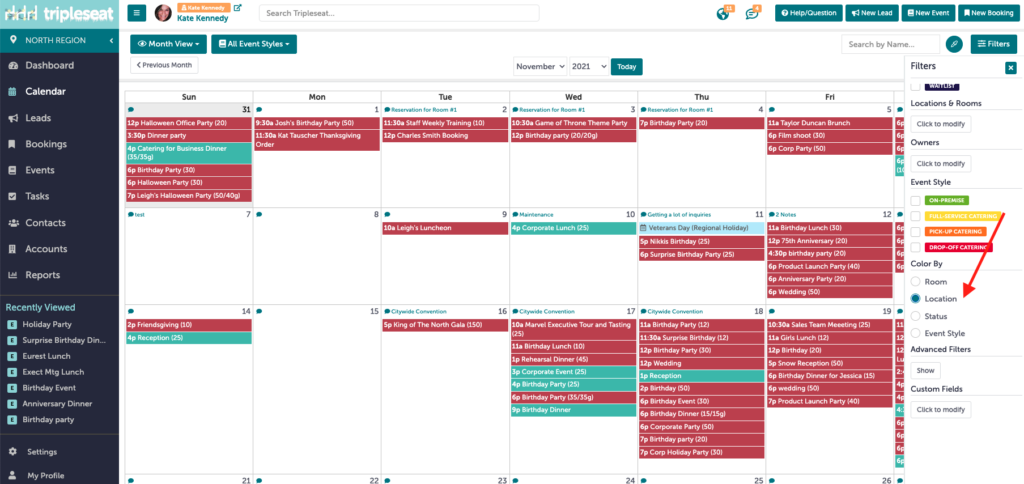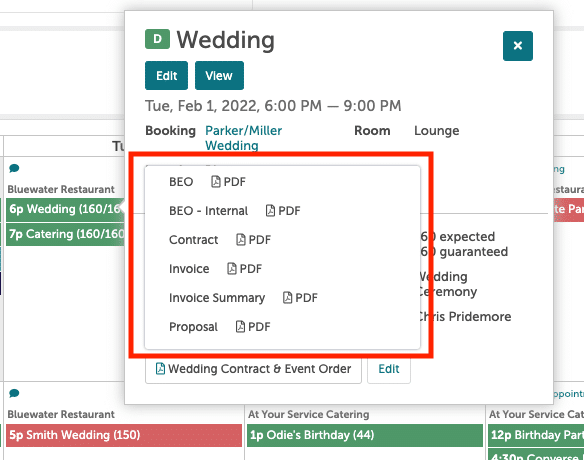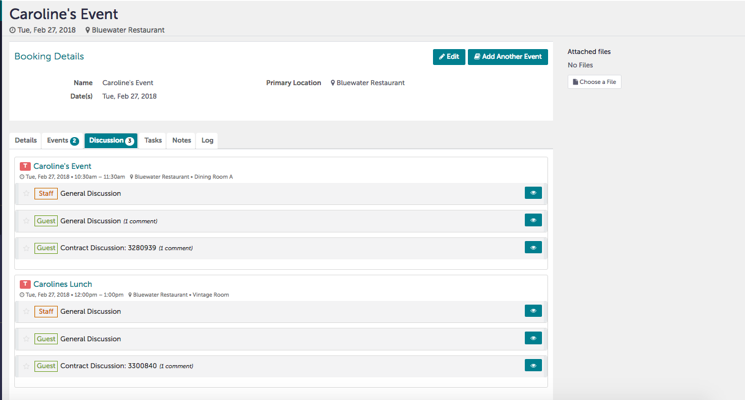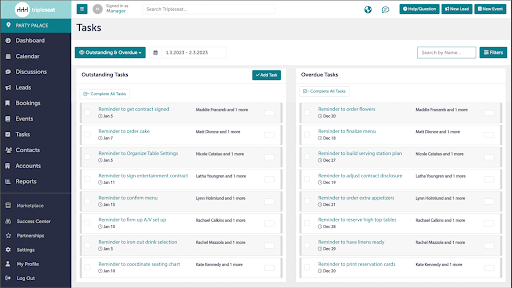9 Signs Your Multi-Location Restaurant Needs Event Management Software

The restaurant industry is booming with multi-location groups expanding like never before, but for owners and managers, event management across many different venues comes with its fair share of headaches. Keeping your brand experience consistent while running things efficiently isn’t just nice to have – it’s make or break in today’s competitive scene. This is where seamless multi-location event operations, specifically event management software, becomes essential.
When you’re coordinating events across several spots, fragmented communication and misaligned operations lead to mistakes, missed opportunities, and ultimately, disappointed customers. Most multi-location restaurants point to communication as their biggest operational challenge, particularly when it comes to multi-location restaurant event management.
Why Events are Important to Multi-Location Restaurants
Events—whether it’s an intimate private dinner or a large-scale catering event—are a powerful driver of revenue and a key opportunity to create memorable experiences that keep customers coming back to your restaurant group.
But managing events across multiple restaurant locations without a unified system? That’s a recipe for chaos. Inconsistent service, pricing confusion, and execution errors can undermine the customer experience and harm your brand reputation across every location. A streamlined, cohesive approach to event management isn’t just beneficial—it’s critical for ensuring consistency, scaling successfully, and maintaining your brand’s integrity at every site.
Signs You Need Multi-Location Restaurant Technology to Manage Events Across Locations
1. Information Silos Across Locations
One of the biggest problems for multi-location restaurant groups is information silos. They appear when each location uses different systems or manual processes for handling inquiries, event bookings, and customer data. This fragmented approach limits visibility across the organization. Multi-Location restaurant event management technology eliminates these silos and allows for performance tracking and shared knowledge across locations
These barriers hinder strategic decision-making at the corporate level and lead to missed opportunities. For example, when a customer who hosted a great event at one location wants to book something similar at another spot, without a centralized system, making that happen smoothly becomes nearly impossible. Without a unified platform, you can’t leverage your collective knowledge to optimize your event business.
2. Coordination Issues Between Teams and Venues
Orchestrating all the moving parts for events across multiple locations becomes complex quickly. Relying on traditional communication methods like phone calls and email threads is inefficient. Event management technology provides standardized processes and communication tools to ensure all team members are aligned and informed in real time.
Making sure the right information reaches the right people at the right time gets exponentially more complex as your venues and events multiply. This leads to delays in responding to clients, confusion about event details, and inconsistencies in how events are executed. Without standardized processes and communication channels, maintaining consistent service standards and brand representation becomes an uphill battle.
3. The Problem of Lost Updates and Miscommunication
Without a centralized system, keeping everyone in the loop at the various stores about changes to event details can be a nightmare. Changes to guest counts, menu selections, or timelines need to be communicated quickly and accurately to everyone involved. Without a unified platform, these crucial updates can easily fall through the cracks, leading to significant errors during the event, unhappy guests, and potential financial hits.
Relying on scattered communication methods increases the risk of teams working with outdated information. Imagine a last-minute dietary restriction not making it to the kitchen staff – that’s a service failure waiting to happen. Without a single source of truth for event information, ensuring everyone has the most current details becomes practically impossible.
4. Inefficient Document Management and Accessibility
Managing documents like contracts, BEOs, and invoices is a challenge when each venue has different systems. Technology for multi-locations offers centralized document management, ensuring version control, quick access, and brand consistency.
This decentralized approach creates all sorts of problems. Version control becomes a nightmare, with staff potentially using outdated contracts. Time gets wasted searching for documents stored who-knows-where, and inconsistent templates can lead to branding issues and even legal risks. A centralized, easily accessible document system is essential for efficiency, accuracy, and brand consistency.
5. Lack of Centralized Communication History
Building strong client relationships is the name of the game in events. But tracking communication history with clients across different venues without a unified system? That’s tough. Important details from initial inquiries, agreements made during phone calls, or preferences shared via email might not be available to other team members or locations.
Without comprehensive communication history, providing personalized service becomes nearly impossible. When different staff interact with the same client at various stages or across locations, they lack context from previous conversations, creating a disjointed experience. Issue resolution also suffers when past communication isn’t readily available.
6. Challenges in Internal Communication and Task Management
Getting your teams across multiple locations working in harmony requires effective internal communication and clear task management. Without dedicated tools and standardized processes, aligning staff on event tasks, meeting deadlines, and assigning responsibilities becomes a significant challenge, leading to missed deadlines, duplicated efforts, and bottlenecks that impact event quality.
When internal communication is fragmented and task assignments aren’t clearly defined or tracked, ensuring all necessary steps are completed on time becomes a guessing game. This creates disorganized workflows, stressed-out staff who aren’t sure of their responsibilities, and a higher risk of mistakes that can derail an otherwise perfect event.
7. Ensuring Menu and Service Consistency
For multi-location groups, delivering a consistent brand experience is crucial – and that includes your menu offerings and service standards for events. Without a centralized system for managing menus and service protocols, inconsistencies inevitably crop up between locations. These variations in food quality, presentation, pricing, or service level can dilute your brand and disappoint customers.
Customers choose your restaurant group expecting a consistent experience, regardless of location. If what they get varies significantly between venues, you’ll struggle to build loyalty across your brand. You need a centralized system that standardizes core menu items and service guidelines while allowing for location-specific flexibility to maintain brand integrity.
8. Limitations in Cross-Location Reporting and Insights
Getting a clear picture of event business performance across your restaurant group is virtually impossible without a unified reporting system. Trying to piece together data from various locations to identify trends, compare metrics, and measure success becomes an exercise in frustration. This lack of consolidated data prevents leadership from gaining valuable insights into the overall health of the event business.
Without centralized reporting, making informed business decisions, identifying improvement areas, and optimizing resources across your organization becomes guesswork. Comparing location performance and identifying best practices that could benefit the entire group turns into a cumbersome, often inaccurate process. Comprehensive cross-location reporting is essential for strategic planning and maximizing profitability.
9. Difficulties in Standardizing Staff Training for Events
Ensuring consistent staff training on event management procedures, customer service protocols, and software tools across all locations is a massive undertaking without a unified approach. When training varies between locations, service quality and operational efficiency inevitably suffer.
Staff trained differently will have varying understanding of best practices and software utilization, directly impacting customer experience and operational efficiency. Developing standardized training materials requires a centralized platform and commitment to ensuring all staff have the knowledge and skills to deliver exceptional events.
How to Tackle Multi-Location Challenges Head-On with Event Management Software
Breaking Down Barriers: Centralized Event Management of Multiple Venues with Tripleseat
Tripleseat offers a robust, cloud-based platform specifically designed to centralize all aspects of multi-location restaurant event management. It breaks down those problematic information silos by providing a single, unified system where all event-related information – from initial inquiries and booking details to contracts, BEOs, and invoices – is securely stored and easily accessible to authorized users across every location.
The platform’s intuitive structure allows seamless management of multiple venues under a single parent account, giving you a comprehensive view of event activity across your entire organization. Users can easily navigate between different groups and individual locations, gaining immediate insights into performance metrics and event status across your organization. This centralized approach improves transparency, facilitates better communication between teams, and enables smarter decision-making at both the venue and corporate levels.
Seamless Collaboration: Tripleseat’s Coordination Features for Multi-Venues
Tripleseat tackles the coordination challenge with integrated features specifically designed for multi-location management. Shared event calendars with location filters provide a clear overview of schedules across your group. Integrated task management allows event managers to assign responsibilities, set deadlines, and track progress in real-time. Internal communication tools facilitate seamless information sharing among staff, ensuring everyone’s aligned regardless of their location.
These collaborative features streamline workflows, minimize miscommunication risks, and ensure teams work together toward successful events. By providing a shared workspace with clear communication channels, Tripleseat helps multi-location groups operate more efficiently and deliver consistently excellent event experiences.

Real-Time Updates and Notifications: Staying Informed with Tripleseat
In the fast-paced tasks of managing events, staying on top of changes is crucial. Tripleseat keeps everyone in the loop with real-time updates and automated notifications for any modifications to event details. Whether it’s a guest count change, menu revision, or timeline adjustment, all relevant staff across every involved location get immediate alerts, ensuring everyone works with the most current information and eliminating errors from outdated details.
This real-time information flow dramatically improves operational efficiency and guest experience. By proactively keeping staff informed, Tripleseat reduces the need for constant manual checks and helps teams adapt quickly to evolving requirements, leading to smoother event execution.
Efficient and Accessible: Tripleseat’s Robust Document Management System
Tripleseat’s centralized document management system is a game-changer for multi-location groups. The platform features a central document library where standardized templates for contracts, BEOs, invoices, and menus are securely stored. These templates can be easily customized to reflect your brand identity and specific requirements, with authorized users across all locations having seamless access to the most current versions.
This centralized approach eliminates version control issues and time wasted searching for files. With a single, accessible repository for all event documentation, Tripleseat promotes brand consistency, improves efficiency, and reduces errors from outdated information.

Maintaining a Clear Record: Comprehensive Communication History in Tripleseat
Building strong client relationships depends on effective communication and understanding past interactions. Tripleseat automatically logs all email correspondence through the system, records notes added to bookings, and tracks Guest Portal interactions, creating a complete, searchable record of client communications accessible to authorized users across all locations.
This centralized history allows any team member to quickly review past conversations, understand client preferences, and provide personalized service. Clients don’t have to repeat information or deal with staff who are unaware of previous discussions, creating a seamless, positive experience.

Empowering Teams: Streamlined Internal Communication and Task Assignment
Tripleseat enhances internal communication and task management with features designed for multi-location operation. The platform allows for discussion threads within event bookings, facilitating focused communication among team members. Robust task management lets event managers assign specific tasks, set clear deadlines, and track progress, ensuring everyone knows their responsibilities and workflows remain organized across all locations.
These dedicated tools enhance accountability, reduce duplicated efforts and errors, and foster collaboration across your restaurant group, making event planning and execution more efficient and effective.

Ensuring Brand Consistency: Menu Management With Multiple-Location Restaurant Tech
Maintaining consistent brand experience includes the menus offered at events. Tripleseat’s centralized menu management system allows creation and management of standardized menus, ensuring consistency in offerings, descriptions, and pricing across venues while providing flexibility for location-specific variations.
This approach ensures customers can expect consistent quality and style regardless of location, helping multi-location restaurant event management teams maintain strong brand identity while meeting diverse client needs.
Gaining Actionable Insights: Powerful Reporting for Multi-Location Performance
Tripleseat’s comprehensive reporting and analytics give multi-location groups valuable insights into event business performance. Customizable reports and business intelligence dashboards track key metrics like lead volume, conversion rates, event revenue, and booking trends across your organization or specific locations. Location filters provide clear performance comparisons, identifying top performers and venues needing additional support.
The reporting features also analyze trends over time, showing seasonality and marketing impact, plus customer behavior insights like event types and average spending. These robust capabilities provide the data-driven insights needed to optimize operations, improve profitability, and make strategic growth decisions.
Facilitating Growth and Consistency: Streamlined Staff Training with Tripleseat
Tripleseat’s intuitive interface streamlines staff training for multi-location groups. The straightforward design and logical workflow make it easy for new team members to quickly become proficient with the system – particularly valuable in an industry with high turnover.
Made for multi-location restaurant groups with a standardized platform across locations, Tripleseat ensures consistent training and processes. This speeds up onboarding and contributes to consistent event execution and customer service across your restaurant group. The easy-to-use interface minimizes learning curves, allowing staff to focus on delivering exceptional experiences rather than wrestling with complicated software.
The Strategic Advantage: Why Event Management Software is Essential for Restaurant Chain Expansion
In the current competitive hospitality market, effective communication and streamlined operations are essential for success, especially during expansion. Industry data consistently shows that restaurants investing in specialized event management software see tangible improvements in both operational efficiency and customer satisfaction. These platforms provide the centralized infrastructure needed to manage multi-location event coordination, ensuring consistent brand experience across venues.
Implementing a comprehensive solution like Tripleseat transforms the potential chaos of multi-location event management into a well-orchestrated process. This leads to improved internal efficiency, fewer operational errors, and enhanced customer experience. When all locations align through a unified system, customers enjoy seamless communication, consistent service standards, and reliable event execution regardless of venue. This consistency builds trust and strengthens brand loyalty – critical factors for sustained growth in the competitive restaurant industry. Investing in dedicated event management software isn’t just nice to have; it’s a strategic necessity for restaurant chains looking to scale effectively and deliver exceptional experiences across all locations.
Are you ready to grow your event business? Schedule a Tripleseat demo to take a closer look at our event management features.
